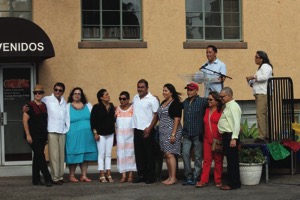
When The San Diego LGBT Community Center launched its Latin@ Services program in the fall of 2004, it was the first such program at an LGBT community center anywhere in the county.
Since then, the program has continued to make history, serving thousands of LGBT Latino/as, as well as their families, through a diverse array of programs, support groups and special events, all provided in a culturally and linguistically competent manner.
“More than half of our community is made up of people of color, and within that, the largest group is Latino,” said Dr. Delores A. Jacobs, chief executive officer of The Center. “It was deeply important to us to be able to successfully create a safe space and a set of culturally competent and affirming services and programs. I think we’ve done that by honoring and respecting people where they are, and by celebrating the culture and heritage that tie people together. All our programs are special, but this one has been particularly important in truly serving the diversity that is our full, vibrant San Diego LGBT community.”
“This program was created to address the unique needs of our San Diego queer community – a rich mix of culture, heritage, identity and gender expression – with compassion and competence,” said Andrea Villa, who has been involved with the program since its inception, when she was a member of The Center’s board of directors. “Border cities are, of themselves, unique environments that give rise to distinct experiences and expression, from language to family life to art and more. The Latin@ Services program was started to acknowledge the unique San Diego environment, focusing on the Latino/a queer experience and to provide support.”
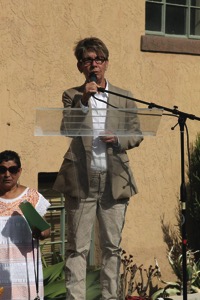
“As the only Latino services program offered by any LGBT community center anywhere in the nation, The Center has created a safe, welcoming and culturally and linguistically appropriate space that allows our community members to accept and embrace all of who they are, including their culture, traditions, language, spirituality and sexual and gender identities,” said Richard Valdez, co-chair of The Center’s board of directors.
Latin@ Services offers a warm and friendly drop-in space – named for local activist Nicole Murray Ramirez at the program’s 10th anniversary celebration – with resources available in Spanish, discussion groups led by Spanish speakers, client advocacy and case management, transgender support services, HIV and STD prevention and education programs, other health education and referrals, social activities and individual and family crisis interventions. All services are offered to individuals and families in a linguistically and culturally affirming manner.
Valdez notes that this program is particularly vital in a community like San Diego. “Given the very large Latino population in San Diego County and the cultural and linguistic needs of our Latino LGBT community members, a strong Latin@ Services program is extremely important in San Diego to reach and serve such a large portion of our population.”
Carolina Ramos, the former director of the Latin@ Services program and now The Center’s director of training and its chief diversity officer, has been with the program from the beginning, providing her with a unique perspective on the growth of the programming, and a sense of the distance some families have traveled in accepting their LGBT sons and daughters.
“There is so much stigma surrounding coming out, and such a struggle to find acceptance of sexual orientation or gender identity. That’s why it’s so important to have a space that is safe, where you can be true to who you are in the culture and language that you are accustomed to,” Ramos said. “There is also stigma around HIV/AIDS and our job is to normalize conversations around sex and testing, and to provide information in a language they can understand. Community connection is so important, and so needed, and we provide that here.”
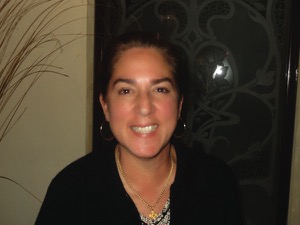
Ricardo Gallego, director of Latin@ Services, has also been with the program since its formation. He has seen, first-hand, the need for services “explicitly directed at the Latino/a community.”
“Our services are tailor-made for individuals and families, making sure that authentic cultural, linguistic and historical sensitivities are respected – and all with a human, caring touch. Nowhere else in San Diego County are you going to find a more culturally sensitive and authentic approach to the Latino/a LGBT community and their families,” Gallego said. “We are succeeding in integrating Latino/a issues with LGBT issues. Latinos/as are more comfortable reaching out to The LGBT Center – we not only speak their language, but also share their cultures, their perspectives and their concerns.”
Villa said the importance of that shared experience cannot be understated.
“We already know, as LGBT people in a hetero-normative society, how important it is to have a space where we can be ourselves without needing to translate into a dominant cultural expression, where we can be known without a need to censor ourselves or our experience,” she said. “Latin@ Services makes that possible for the queer Latino/a within the larger LGBT community. In addition to the services and programs in place at Latin@ Services, I think its very existence meets that fundamental need for expression and being truly seen.
“There isn’t anything else like it in San Diego – a place where the queer Latino community can go to be heard, seen and supported in everything to health care advocacy to coming out to one’s family to education and advocacy for the transgender Latino community, and more – all in a welcoming space where neither language nor experience requires translation,” she said.
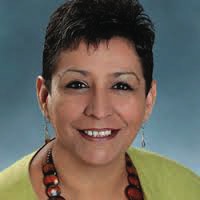
Everyone connected with the program mentioned the importance of “familia,” both in the focus on the families of LGBT people, and specifically the program’s much-heralded educational video, Mi Familia.
“I was extremely honored to have been the chair of the board of directors when The Center’s Latin@ Services Program was opened ten years ago. Being the first Latino chair of the board, and having grown up in San Diego in a Latino family which has always strongly embraced our cultural identity and traditions, I am very well aware of the need for services for our LGBT Latino community,” Valdez said. “I was fortunate to have a family who embraced and supported me after coming out as a gay man. I know the importance of that familial acceptance, particularly in a culture that places so much importance on “la familia.” I am so happy that The Center is that warm, welcoming and affirming place where my Latino brothers and sisters can visit to get the support that they need.”
“For me, personally, the establishment of the Mi Familia program and especially the father’s discussion group are deeply moving accomplishments,” Villa said. “My own father passed away when I was in my late teens and I wish there had been something similar for our family. I’m so grateful that it’s here now, though, and that in some small way Mi Familia is making it possible for families to grow together with the tools for understanding, support and love.”
Ramos, too, noted the impact of the Mi Familia video as one of the most significant accomplishments of Latin@ Services in the past decade.
“It is one of the things I’m most proud of – that we created this documentary that helps other families deal with the challenges of embracing their LGBT loved ones through other people’s stories,” she said. “We – and many others – have been able to use the video as a tool to educate Latino communities about how they can embrace their loved ones, without feeling guilty about their spiritual practices or what society or the church says.”
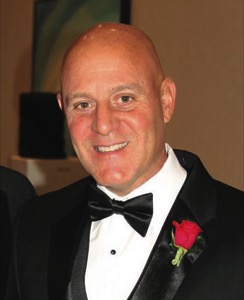
Ramos noted that not only has the video been utilized on the local level, including 150 copies given to counselors at San Diego city schools, but also on a national and international level, with screenings in Chicago, New York, Chile and Peru, just to name a few.
“We are trying to do away with the stigma of embracing your LGB or T kids,” Ramos said. “The more we work with the parents, the less risk our LGBT youth face, and parents don’t lose years and years with their kids, or aren’t going to throw their kids out of the house.”
As an example, Ramos shared a story of a mother who took 10 years to fully accept her daughter’s sexuality. “Her journey took 10 years, but she got there. And now, that same parent – at her beauty shop – starts to educate others in her community when she hears discriminatory language. She now has the language to stop those kinds of conversations and to advocate for her daughter; ‘You’re talking about my daughter and I don’t like it.’ That is incredible courage, and it has really been a privilege to see these families who have really struggled with their child’s sexual orientation or gender identity, but to get to the level of acceptance to come out about having a kid who’s gay or lesbian or bisexual or transgender.”
The stories of family acceptance are inspiring, and are often a result of the work of Latin@ Services; many LGBT Latinos still struggle with isolation and the stigma of being gay and/or living with HIV/AIDS.
“We are able to work with our clients who have been living with HIV and AIDS for a long time,” Ramos said. She said she and Gallego have worked closely with these individuals, especially toward the end of their lives, to make them as comfortable as possible. “We try to make their transitions as peaceful as possible. We visit them in hospice or at the hospital. They trust us, and they know we’ll take care of everything. This is also the sense of familia.
“People trust us,” Ramos said, “and that’s why we’ve been so successful over the past 10 years. No one is providing what we provide.”











